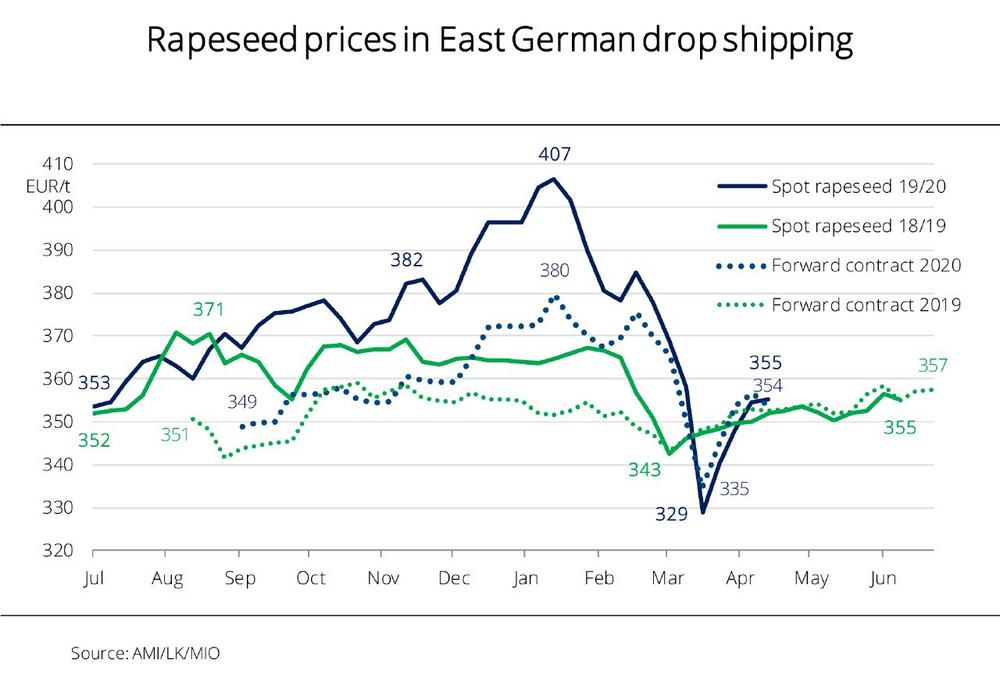
Oil mills pay more for 2020 crop
Ex-farm prices of rapeseed experienced a steep decline in February, plummeting to EUR 329 per tonne, the lowest level since May 2018. Prices have gradually moved up since mid-March on support from the futures markets. However, the increase has hardly been based on new or old-crop transactions. Many producers sold out exceptionally early this year, stocking only few remaining quantities from early February onwards. Oil mills are stocked up well until the end of the 2019/20 marketing year and hardly show any interest in making spot purchases.
On the other hand, demand from oil mills for batches of rapeseed ex crop 2020 has been especially strong since mid-March and started earlier than in previous years, because another shortage in rapeseed supply is expected for 2020/21. Because of this, processors are keenly interested in securing their re-supply. However, farmers‘ willingness to sell is virtually non-existent, because the corona crisis has caused uncertainty. Also, the price level is unattractive and the development of the field crops is uncertain. Night frost, insufficient rainfall and pests curtail the yield potential in some locations. No farmer wants to conclude contracts for commodities they will not be able to deliver. This situation has lifted pre-contract prices above the level of spot prices earlier and further up than in the previous year.
UFOP has expressed fears that the current market situation offers little incentive for farmers to expand the scale of rapeseed cultivation. Pressure on vegetable oil supply continues to be unabatedly strong worldwide. UFOP has stressed that, for this reason, the importance of demand from the biodiesel industry should be highlighted again and again. According to the association, the biodiesel industry will remain the key recipient of rapeseed oil that is certified as sustainable in the future. However, in the vegetable oil market pricing is strongly influenced by the low level of palm oil prices.
Consequently, UFOP has called on the Federal Ministry for the Environment to finally, as soon as possible, create the legal basis for abandoning the use of biomass feedstock with a high risk for changes in land use. This step would stimulate the domestic market in Germany, especially because German oil mills process more than 9 million tonnes of rapeseed per year, while also making by far the most important contribution to GM-free feed protein supply with more than 5.4 million tonnes of rapeseed meal. UFOP has emphasised that dairy farms rely on this supply and also pointed out the regional nature of both rapeseed production and processing at oil mills.
The Union for the Promotion of Oil and Protein Plants e. V. (UFOP) represents the political interests of companies, associations and institutions involved in the production, processing and marketing of domestic oil and protein plants in national and international bodies. UFOP supports research to optimise agricultural production and for the development of new recycling opportunities in the food, non-food and feed sectors. UFOP public relations aim to promote the marketing of domestic oil and protein plant end products.
UFOP – Union zur Förderung von Oel- und Proteinpflanzen e.V.
Claire-Waldoff-Str. 7
10117 Berlin
Telefon: +49 (30) 2359799-40
Telefax: +49 (30) 2359799-99
http://www.ufop.de
UFOP e. V.
Telefon: +49 (30) 31904-215
Fax: +49 (30) 31904-485
E-Mail: d.bockey@ufop.de
![]()




